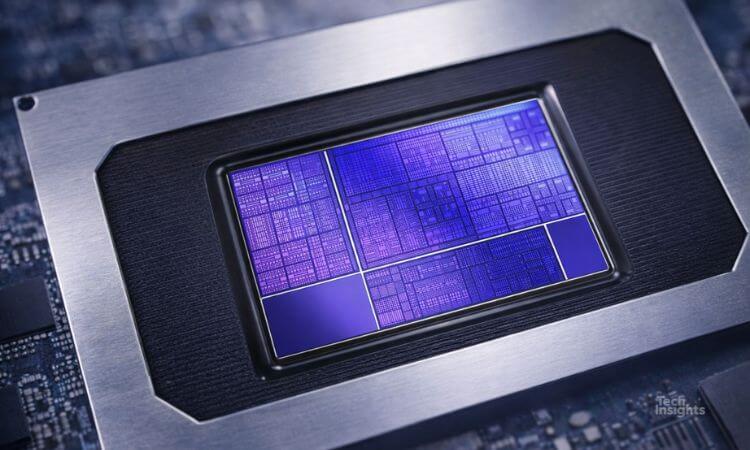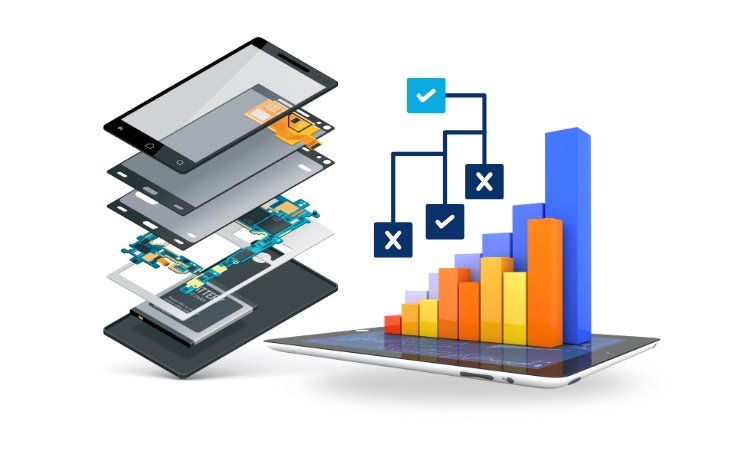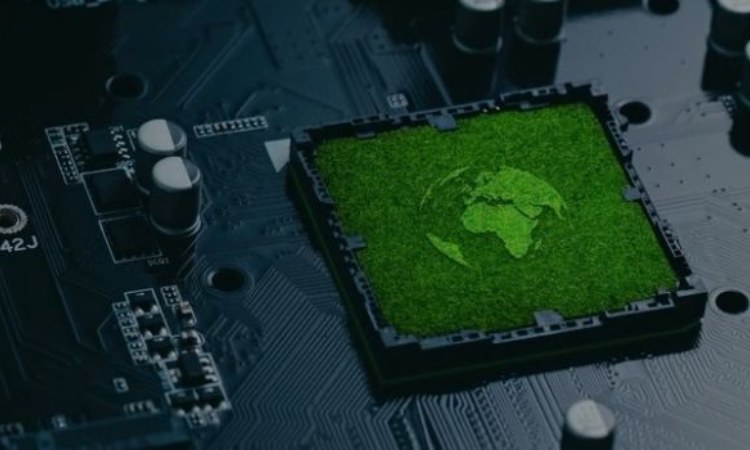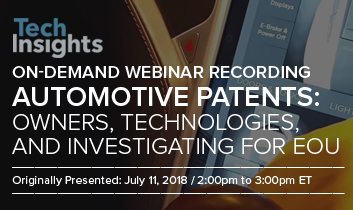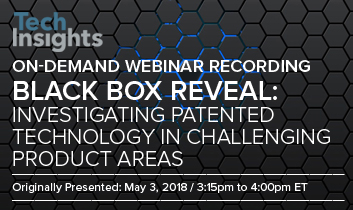Compliment your patent knowledge with our technical expertise
Technology and Intellectual Property Seminars (TIPS) is a lunch and learn series, designed for law firms, to increase awareness of different facets of patent management, assertion, and defense from a technology perspective.
You know patents from a legal perspective
We know them from a technology perspective
A winning partnership for your high-tech clients
Available TIPS presentations
TechInsights has prepared a number of educational programs that can be delivered via webinar when it is most convenient for your organization. Each program includes approximately 30 presentation minutes, and 30 minutes of Q&A with one of our technology IP experts.
Presentations we previously delivered are available on-demand:
TIPS presentations are a value-add, no-cost service offered by TechInsights.
Our current selection of TIPS presentations includes:
Techniques to Analyze NAND Flash and SSD Devices - Internal Probing, Waveform Analysis, and More
The widespread adoption and expansion of data centers has driven the SSD market to a period of high competition and high innovation, particularly in the areas of controllers and NAND flash memory devices.
TechInsights uses custom IC circuit reverse engineering and probing methods on various planar and 3D MLC and TLC NAND flash memory devices to uncover and analyze the internal mechanisms that comprise the major operational functions.
In this presentation, we will examine some of the areas of innovation in NAND Flash and SSD devices and provide an overview of the various testing methods we apply to analyze these innovations. Topics discussed will include:
- Architecture and functionality changes between 3D NAND and planar NAND, and the examination of resulting changes in waveform algorithms
- More complex waveforms designed to achieve further precision on memory bit programming while minimizing durations
- System level changes designed to accommodate both a growing number of pages per block from 3D NAND, and further enhancement of drive performance when storing at TLC or denser bits per cell
The Mobile Radio Frequency Landscape - A Patent and Technology Perspective
We estimate the mobile Radio Frequency (RF) market to be worth approximately $19B. Mobile RF innovation aims to improve performance while also reducing cost, complexity, and power. Manufacturers today, however, are faced with increased complexity brought about by new standards (such as 5G), carrier aggregation, multi-mode phones, and consumer’s ever-increasing demands for bandwidth and reduced power consumption.
TechInsights analyses mobile RF devices from antenna to transceiver to baseband processor. Clients’ use cases of competitive technical intelligence and determining evidence of use are enabled by viewing this analysis within the world’s largest database of semiconductor reverse engineering; for mobile RF this includes process and package analysis, transistor characterization, architecture and circuit analysis. We see different approaches to addressing complexity issues; while some vendors are providing pin-compatible components that enable a common architecture to support different bands/regions simply by replacing components, other vendors are focused on more integrated architectures.
The automotive industry is facing disruption from new market entrants, emerging mobility business models and changing consumer attitudes about car ownership. The future of mobility is evolving, and the automobile is becoming a much more complex system.
ADAS and safety-related features are proliferating in response to government regulation and new vehicle safety rating programs like Euro NCAP. Consumer demand for superior connected user experiences in their cars is driving development of sophisticated infotainment systems, enhanced human-machine interfaces, and data connectivity. Autonomous vehicles will require advanced perception technologies, including radar, lidar, cameras, and AI processors. Government policies promoting alternative fuel vehicles are stimulating innovation in energy storage technologies, such as battery cell structures, fuel cells, and new materials.
New technology brings new patents, and in this relatively untested market, it remains to be seen whether auto-tech will experience its own smartphone-style patent wars, or if lessons learned there will translate into enhanced protection through partnerships and savvier prosecution and patent assertion programs.
We have developed this program to provide an overview of technology-based patenting strategies in the modern automotive market.
- Understand the landscape: players, products and patents
- Learn where to find evidence: semiconductor, sensors, electronic, and software
- Learn to quickly find patents of value that read on this evidence
This presentation will provide examples of information and strategies to prepare for the upcoming acceleration of automotive IP management and monetization.
Black Box Reveal - Investigating Patented Technology in Challenging Product Areas
"Black box reveal" is the term we use to refer to “the hard stuff” – technology that, for one reason or another, is difficult to analyze for evidence of use. These can be devices that are physically impossible to re-create, virtual environments, devices located in remote or impossible to access locations, encrypted devices, etc. Some sample use cases include:
- Determining the unlock code for a cell phone
- Testing the process flow in a manufacturing environment
- Identifying the chemicals used in the creation of a semiconductor chip
- Determining structures and operation of a sea of gates
- Testing location-specific products
- Finding software innovations in embedded applications
- Determining implementations of features in the cloud
Because of the complexity that can be involved in a black box reveal, the key deciding factors often cost, time, and likelihood of success. Generally speaking, if a thing can be built, it can be un-built (reverse engineered); what can determine if it should be is the potential benefit of the black box reveal to the current business need.
This program will address:
- Some of the different use cases where black box investigation may be required
- Defining the price point at which black box reveal moves from “difficult” to “unfeasible” for an organization
This presentation will provide examples of information and strategies to prepare for the upcoming acceleration of automotive IP management and monetization.
Using Technical Evidence to Strengthen Patents
Patent Strengthening is a term we use to describe the different methods that can be applied during the prosecution to both maximize the usefulness of a patent once it grants, and to ensure your time and money are focused on your most valuable assets.
At a high level, there are four opportunities for patent strengthening:
- Identifying potential use of the invention in commercial products
- Determining market adoption
- Identifying continuation opportunities, and tuning their claims to commercial products
- Abandoning less valuable applications
Applying these practices in an advanced technology environment requires not only an in-depth understanding of the technology being described in the application, but the ability to pair that understanding with irrefutable, factual evidence.
This program includes discussion on when to gather in-depth technical evidence, examples of the types of evidence that can be produced through technical analysis, and methods to apply that evidence during prosecution to strengthen patents.
Finding Evidence of Use in Technology – the Good, the Bad, and the Ugly
TechInsights has identified Evidence of Use (EoU) for over 6,000 unique patents. In doing so, we have significantly evolved our understanding of what patents can be supported with EOU and honed our expertise in mapping claim elements to evidence – sometimes in very difficult to detect applications. We develop imaginative new ways to find EoU when we encounter technology challenges, such as:
- Identifying materials used in the creation of a semiconductor chip
- Determining structures and operation of a sea of gates
- Testing location-specific products
- Finding software innovations in embedded applications
- Determining implementations of features in the cloud
- Working around encrypted environments
Because of the complexity that can be involved in finding some evidence, the key deciding factors often come down to cost, time, and likelihood of success. To manage risk, projects are staged so that success is achieved in incremental steps.
This program will address:
- The deepest technical analysis methods required to prove claim elements
- Some examples of success, to give a context of what is achievable
- A summary of types of challenges that can be considered difficult or prohibitive
Supreme Court Strikes Down IEEPA Tariffs | Semiconductor Impact
The Supreme Court invalidates IEEPA tariffs as the U.S.-Taiwan trade deal reshapes semiconductor import policy. Read the TechInsights report.
Chip Observer: CES 2026, AI Power Plays, and a $48B M&A Surge
CES 2026 semiconductor news: AI PCs, Snapdragon X2 Elite, $48B in M&A, ZAM memory, and a 2026 forecast projecting a $1 trillion chip market.
Intel Panther Lake on Intel 18A: Strategic & Geopolitical Analysis
Explore Intel Panther Lake on Intel 18A, examining advanced-node execution, IDM 2.0 credibility, and strategic implications for the global semiconductor ecosystem.

